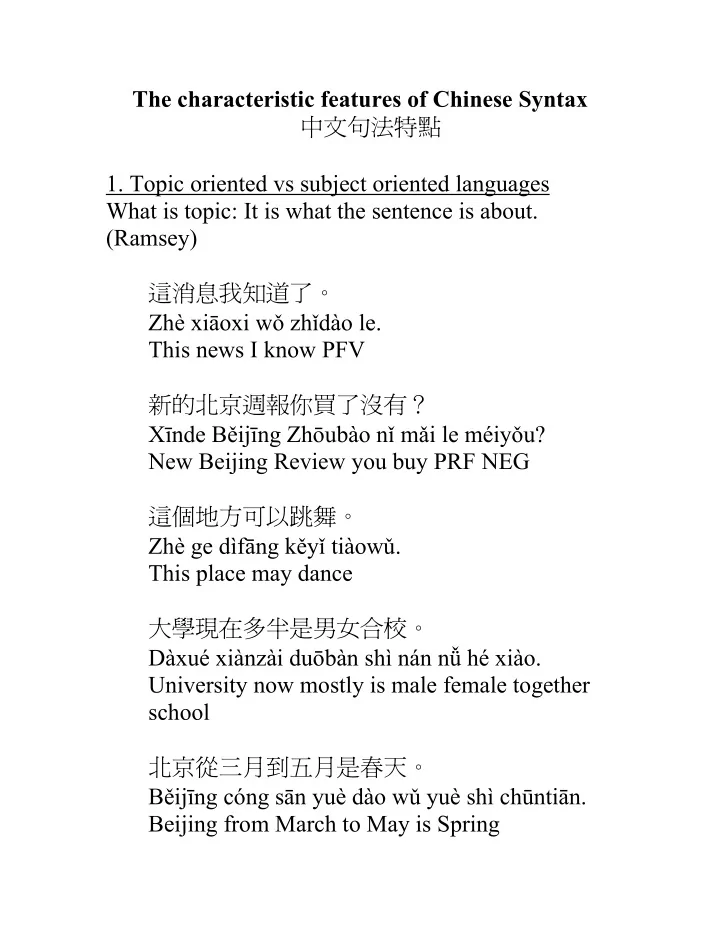

The characteristic features of Chinese Syntax 中文句法特點 1. Topic oriented vs subject oriented languages What is topic: It is what the sentence is about. (Ramsey) 這消息我知道了。 Zhè xi ā oxi w ǒ zh ǐ dào le. This news I know PFV 新的北京週報你買了沒有? X ī nde B ě ij ī ng Zh ō ubào n ǐ m ǎ i le méiy ǒ u? New Beijing Review you buy PRF NEG 這個地方可以跳舞。 Zhè ge dìf ā ng k ě y ǐ tiàow ǔ . This place may dance 大學現在多半是男女合校。 Dàxué xiànzài du ō bàn shì nán n ǚ hé xiào. University now mostly is male female together school 北京從三月到五月是春天。 B ě ij ī ng cóng s ā n yuè dào w ǔ yuè shì ch ū nti ā n. Beijing from March to May is Spring
那兩個人,一個姓張,一個姓李。 Nà li ǎ ng ge rén, y ī ge xìng Zh ā ng, y ī ge xìng L ǐ . that two person, one MW surname Zhang, one MW surname Li
2. Ellipsis (topic deletion in context) ( 他 ) 還沒來? (T ā ) hái méi lái? (He has) not come yet? ( 你吃什麼? ) (N ǐ ch ī shénme?) (What are your eating?) 我是冰淇淋。 W ǒ shì b ī ngqílín. I am ice-cream. ( 這個女人的丈夫是美國人。 ) Zhè ge n ǚ rén de zhàngfu shì M ě iguó rén. This woman’s husband is American. 她也是美國丈夫。 T ā y ě shì M ě iguó zhàngfu. She is also an American husband.
3. No tense, but aspect is marked Perfective Aspect marker 了: A bounded event (Li and Thmpson, 1981) Verbal aspect suffix –le expresses perfectivity , that is, it indicates that an event is being viewed in its entirety or as a whole. An event is viewed in its entirety if it is bounded temporarily, spatially, or conceptually. 他畢業了。 T ā bìyè le. he graduate PFV A quantified event: 他睡了三個鐘頭。 T ā shuì le s ā n ge zh ō ngtóu. he sleep PFV three MW hour 我見到了她。 W ǒ jiàn dào le t ā . I see PFV her 他去年死了。 T ā qùnián s ǐ le. he last year die PFV
LE: Imminent action 他快來了。 T ā kuài lái le. he soon come LE LE: Change of status 雨不下了。 Y ǔ bú xià le. rain not descend LE LE: Sentence-end particle 我們走了。 W ǒ men z ǒ u le. we leave LE. Durative (Progressive) 在 and 著 � Only “activity” verbs can take 在 to indicate the durative aspect. 张三在解释文法。 Zh ā ng S ā n zài ji ě shì wén ǎ Zhang San DUR explain grammar � An activity verb that signals a state associated with is activity meaning takes 著 as the durative aspect marker.
他在屋子里坐著。 T ā zài w ū zi l ǐ zuò zhe. He at room PL sit DUR Experiential 過 : means an event has been experienced with respect to some reference time. When the reference is left unspecified, the –guo signals that the event has been experienced at least once at some indefinite time, which is usually the indefinite past. 我吃過日本飯。 I eat EXP Japan food. W ǒ ch ī guò Rìb ě n fàn. LE is not Past Tense 喝了它! Drink it! H ē le t ā ! 明天我就走了。 I will leave tomorrow. Míngti ā n w ǒ jiù z ǒ u le. 我吃了中飯再走。 I will leave after lunch. W ǒ ch ī le zh ō ngfàn zài z ǒ u.
4. Measure words (classifiers) 大量的量詞 For Animals 一條狗 – y ī tiáo g ǒ u a dog 一頭牛 – y ī tóu niú a cow 一匹馬 – y ī p ī m ǎ a horse 一條魚,一尾魚 – y ī tiáo yú, y ī wéi yú a fish 一只蚊子 – y ī zh ī wénzi a mosquito For Human 一個人 – y ī ge rén a person 一個老師 – y ī ge l ǎ oish ī a teacher 一位教授 – y ī wèi jiàoshòu a professor 一位客人 – y ī wèi kèrén a guest 一名記者 – y ī míng jìzh ě a newspaper reporter For Things 一棟(幢、所)房子 - y ī dòng (zhuàng, su ǒ ) fángzi a house 一把椅子 – y ī b ǎ y ǐ zi a chair 一扇窗戶 – y ī shàn chu ā nghù a window 一管牙膏 – y ī gu ǎ n yág ā o a tube of tooth paste 一封信 – y ī f ē ng xìn a letter
4. Modifications (Left-branching vs. right branching) modifier-head (Chinese, Japanese) vs. head-modifier (English) Adjective 紅的蘋果 hóng de pínggu ǒ red apple 漂亮的姑娘 piàoliang de g ū niang beautiful girl Relative clause (specific) 我買的書 w ǒ m ǎ i de sh ū I buy DE book 賣了的房子 mài le de fángzi sell PRF DE house 昨天到這兒來的那個人 zuóti ā n dào zhèr lái de nà ge rén yester to here come DE that MW person Prepositional phrase 在圖書館看書 zài túsh ū gu ǎ n kàn sh ū in library read book 給他打電話 g ě i t ā d ǎ diànhuà to him make phone-call
5. Predicates: Adjectives and nouns can be predicates 中文不僅動詞作謂語,形容詞名詞都可以作謂語 Verbal predicate 我吃飯 I eat meal Verbs can be negated by using ‘bù’ 可以用“不”否定(沒有) Verbs can be attached by ‘le’ ‘zhe’ and ‘guo’ to express aspects ‘perfective’, ‘durative’ or ‘experiential.’ 可以加“了”“著”“過” Adjectival predicate 這幢 房子 很 漂亮 This house very beautiful. The following adjectives can be predicates 小心 to be careful 好 to be good 甜 to be sweet 白 to be white, to white Nominal predicate
他二十歲。 he twenty years-old 今天星期一。 Today Monday 這本書二十塊。 This book twenty dollars 張三好人。 Zhang San good person
Recommend
More recommend